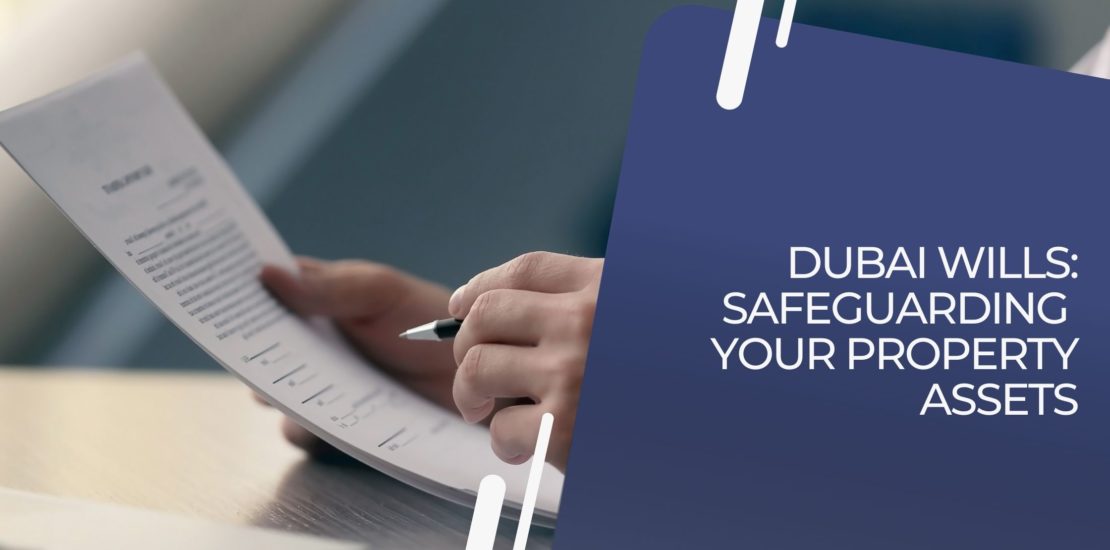- June 25, 2021
- Posted by: Philip Smith
- Category: Property Gifts

Dubai Wills: Safeguarding Your Property Assets in the U.A.E
Dubai Wills Explained
I was having lunch with a friend the other day and he mentioned that he was looking into the issue of preparing a Will in Dubai. Now, my friend is not old by any means (late 20s) but has recently purchased his first home with his wife so the subject of Wills is something that he has had to consider sooner rather than later. This too got me thinking about the topic especially seeing that I work with Dubai property owners each and every day within my role as a Power of Attorney at Your POA. On the most part, property owners in Dubai are not overly familiar with the rules and regulations surrounding inheritance matters or Wills here and the subject is almost taboo. The whole area is something that most people do not like to think about (for obvious reasons) but quite ironically it is also something that is very important to consider especially for those living in Dubai.
Here, I will try to provide some more information on this matter as well as explaining what the current rules and regulations are surrounding Wills in this region. Hopefully you will find the information useful enough so that can decide for yourself as to the best approach in your individual circumstances.
What Exactly Is A Will?
A Will is a legal document that outlines how your assets will be distributed in the unfortunate instance of your death. Wills general include a wide variety of assets; from money to jewellery to cars/vehicles to other personal belongings. Our main concern is of course real estate. Most Wills are used to outline clearly what will happen to your property once you die. In this legal document, you will expressly name the beneficiaries (normally family members) for some or all of your property/properties. It is important to have this in writing, signed and dated by you and witnessed accordingly.
Why Would I Need A Will Anyway?
Creating a Will allows you to outline very clearly how your assets are to be distributed. You decide personally who is to do what/have what once you die. Without a Will, this area can become very messy and potentially lead to disputes and even legal cases. In Dubai, this area is particularly controversial given the inclusion of the rather complicated and often misunderstood Sharia law principles. In practice, if there is no Will in place, the UAE courts will follow Sharia law. We will touch more upon this below.
Inheritance Issues In The UAE
Inheritance and issues surrounding Wills in the UAE is certainly not a straight forward subject and many property owners and investors still remain unaware of the current rules and regulations involved.
Generally speaking, when a Muslim individual passes away, their assets are dealt with according to Sharia law. From my experience, this is not an issue for most Muslims as they are more than happy to follow the principles set out in the Holy Quran. For non-Muslims however, this can become very difficult as when there is no Will in place at the time of a death, the Dubai Courts decide how your assets are to be distributed. The deceased’s bank accounts will be frozen until such as decision is made.
While the existing UAE law in theory provides that the law of the home country of a non-Muslim should apply, in practice the Dubai Courts seem to apply Sharia law at first instance. In many cases, particularly for non-Muslims, this can often cause financial and emotional difficulties for the surviving family members. This area becomes even more complicated due to the fact that the UAE laws are rather ambiguous in this respect.
Law No. 5 of 1985 regarding the law of Civil Transactions & Federal Law No. 28 of 2005 regarding the UAE Personal Affairs Law
Law No. 5 of 1985 states that the law of the individual’s home country does apply when distributing the assets of a deceased individual however there seems to be some contradiction as it also suggests that the UAE laws however apply when it comes to real property located in the UAE.
The Personal Affairs Law does clarify things in some respects by suggesting that a non-Muslim expat with a property in the UAE can use a Will to allow the application of the law of his/her home country to prevail over Sharia Law. This is not conclusive however and there has been much debate over the actual terminology used, especially as the two laws seem to contradict one another. The whole area is rather ambiguous and unclear – perhaps even more of a reason to consider seeking legal advice now and/or preparing a Will in advance to try to circumvent these uneasy situations.
Generally speaking, it does seem that Sharia law governs inheritance issues for Muslims however the law of the deceased’s home country can be applied for non-Muslims. This is not a given however and it often depends on the individual circumstances of the case and indeed the judge who is making the ruling.
What Does Sharia Law Involve?
Sharia law is the legal framework governing those of the Islamic faith. It sets out key principles and a code of living that all Muslims should adhere to according to God’s wishes (if any of my Muslim friends or colleagues wish to help me explain this more clearly, please feel free to comment!)
In inheritance issues for Muslims, Sharia Law is used to distubute assets once a person dies. Although there is no set precedent in place and a judge can make an order based on individual circumstances of each case, there is often a formula followed in practice. Without going into too much detail with this (I am again not an expert on the Quran and there is not enough time here to go over this fully), the general rule is that the assets/property will pass to the male heirs first in a preferred order (son, son’s son, father, father’s father, brother, brother’s son, father’s brother, father’s brother’s son, husband) followed by the female heirs (again in a particular order). If none of the above are alive, the assets may be distributed to non-inheriting relations.
As mentioned, the area is quite complicated and gets further confusing (certainly to non-Muslims) with this being divided by fractions/shares. As an example, the wife of a deceased male will only qualify for 1/8th share when her husband leaves children. For a more in-depth look at this, please have a look at this website that I came across when reading up on this topic – http://www.sailanmuslim.com/news/inheritance-according-to-islamic-sharia-law/.
DIFC Wills & Probate Registry
Thankfully (from the view of a non-Muslim expatriate!), there have been some extremely important changes involving Wills and succession matters in Dubai. In May 2015, the Dubai International Financial Centre (DIFC) introduced a much anticipated Wills and Probate Registry. It was and continues to be quite the ground breaking move for the MENA region in that it creates a new set of rules and regulations for non-Muslims who have assets in Dubai. It is “the first Common Law, English Wills and Probate service for non-Muslims in the Middle-East.” http://www.difcprobate.ae/
Non-Muslims can now register a Will at the DIFC under internationally recognised principle of Common Law rather than following UAE laws and/or Sharia law. A non-Muslim can now legally decide how their assets are to be distributed if he/she passes away – complete testimony freedom to dispose of their assets as they see fit. The only requirements are that your are non-Muslim, over 21 years of age and you have assets in Dubai. Significantly, the service is also available to non-residents, which will be welcomed by many of our clients at Your POA.
The Registry works within the DIFC Courts and as the order will be issued by the DIFC Court, it will be enforceable in Dubai without the need to apply through the Dubai Courts. It is also expected to follow suit at the Dubai Land Department. Therefore, if an individual prepares a Will in DIFC, this will be registered with the Dubai Land Department as well.
The process is a relatively new one and is still in its early stages. It is also appears to be a lot more expensive (somewhere between AED 10,000-AED 15,000) than the Dubai Court process. The benefits, however, are clear to see for all non-Muslims expatriates. It will also create certain precedents for future inheritance cases again meaning more clarity and legal certainly as well as making it a much easier and more familiar process.
All of this is fantastic news for non-Muslims as for the first time it will afford them clear rights according to their home country and prevent Sharia law rules from taking precedence over their assets. It will also remove all of the legal uncertainly and ambiguity previously seen in the old UAE laws. It certainly simplifies the legal framework surrounding inheritance matters in Dubai. It is an important and indeed necessary step in the right direction and one that has been welcomed by many members of the legal community as well as Dubai property owners and investors.
So What Are You Waiting For?
If you are like my aforementioned friend and are currently holding assets in the UAE, you should seriously consider preparing a Will now. It is not a particularly nice thought but no one knows what can happen one day to the next so safeguarding your assets should be a priority and will certainly prevent some serious complications further down the line. Making a Will can save your family time, money and grief as well as give you peace of mind.
The new DIFC Registry has also come a long way to improving the position for non-Muslims in this region and we would hope that this will only continue to improve in the future. The Registry will also govern and indeed significantly improve guardianship issues if a deceased individual leaves children behind (Sharia law does not necessarily entitle the mother to legal guardianship), something that will be at the forefront of many people’s mines.
[Nb – The author of the above article is an LLB Bachelor of Laws graduate from the UK and is the Managing Partner of Your POA Dubai (www.yourpoadubai.com). Your POA specialise in representing national and international clients as Power of Attorney for a wide range of property related matters; from Property Handovers & Title Deed Registrations to Sales, Purchases & Gift Transfers. If you need a Power of Attorney or have questions on any property related matters in Dubai, please contact us here or call on +971 52 832 7420]

